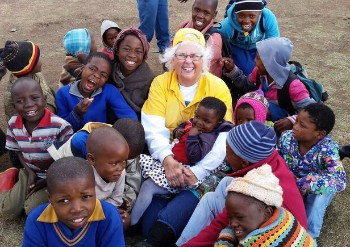
Disaster relief volunteer Karen Smith of Shepherdsville has bonded with the people of LeSotho, Africa, where a drought has created severe food shortages. (KBC photo)
SHEPHERDSVILLE — Residents of drought-stricken Lesotho, Africa, became like family to 64-year-old Karen Smith of Shepherdsville, the first time she took them food.
“You go with expectations of doing a job and it quickly becomes more than a job. It becomes personal,” Smith, volunteer feeding coordinator for the Kentucky Baptist Convention, told Baptist Press.
“That first little boy that came and sat in my lap, it stopped being a job. It began to be personal, because then I met moms and dads and just got to know the families.”
Smith served on two of the six disaster relief teams the KBC has sent to southern Africa since 2016 in response to a drought affecting large swaths of sub-Saharan Africa. The U.N. has described the drought and famine, which extends into South Sudan and the greater Horn of Africa, as the largest humanitarian crisis since 1945.
KBC Disaster Relief works in sub-Saharan Africa in coordination with Baptist Global Response partners and with International Mission Board workers there, KBC Disaster Relief director Coy Webb said, distributing a million meals to thousands of families in 2016 through 20-day food rations.
“It was almost a complete crop lost last year. Many of the people in the mountains … basically had no food,” Webb said. “The situation could have been life-threatening for many. … There is no other place to turn when the crops fail. They have no food.”
A six-member KBC team returned March 20 from a food distribution trip to Zimbabwe, where about 4.1 million people were expected to need food aid through March, the United Nations Office for the Coordination of Humanitarian Affairs (OCHA) said. Kentucky volunteers distributed 75,000 meals in Zimbabwe, Webb said.
The trips also provide opportunities to share the gospel, said Sammy Hammons, a disaster relief chaplain from Kirksville Baptist Church in Richmond, who made the Zimbabwe trip and also traveled to LeSotho in June 2016. In Zimbabwe, he traveled 1,200-plus miles to villages to share the gospel and distribute food. Churches receiving food put the needs of surrounding communities ahead of their own as an avenue of sharing the gospel, Hammons recounted.
“Many of the churches in the villages used this to reach the people around them with the gospel by keeping 25 percent of the food for themselves and giving 75 percent to the people around them,” Hammons said, “inviting them to come and hear the Good News of Jesus Christ, then giving them food. There were four people saved that week with many seeds sowed.”
Hammons sees the food distribution as a Great Commission opportunity to speed revival in what he describes as “he most unlikely place…. Doing international food distributions to famine-stricken villages and sharing the Good News of Jesus Christ is meeting the physical and spiritual needs of a lost world that needs salvation.
“The village children (of Mberengwa, Zimbabwe) put on a singing for the mission team,” Hammons said, “then asked us to sing to them and give testimonies of our faith, then to share the gospel one more time please.”
Current OCHA numbers from Zimbabwe include only rural communities, OCHA said, but the country also is addressing the drought’s impact on urban areas. With 42 percent of the rural population needing food there, increased malnutrition and limited access to clean water have been reported.
In LeSotho, more than 200,000 people require emergency livelihood support, OCHA said, included in nearly a half-million who will need “life-saving and livelihood protection interventions” through October. A full half of LeSotho’s rural population will need food aid through April, OCHA said.
Webb, who coordinates seven-to-10 international disaster relief mission trips a year from Kentucky, pointed to Southern Baptists’ Global Hunger Relief fund as an efficient way to help those in need.
Families receiving help are very appreciative, Smith said.
“I know here in the United States it takes us a while to create relationships, but they happen really quick there,” she said. “When I went back the second time — I was only there less than two weeks the first time — but some of the people greeted me like a long-lost relative.
“That’s just part of my family now.” (BP)
Diana Chandler